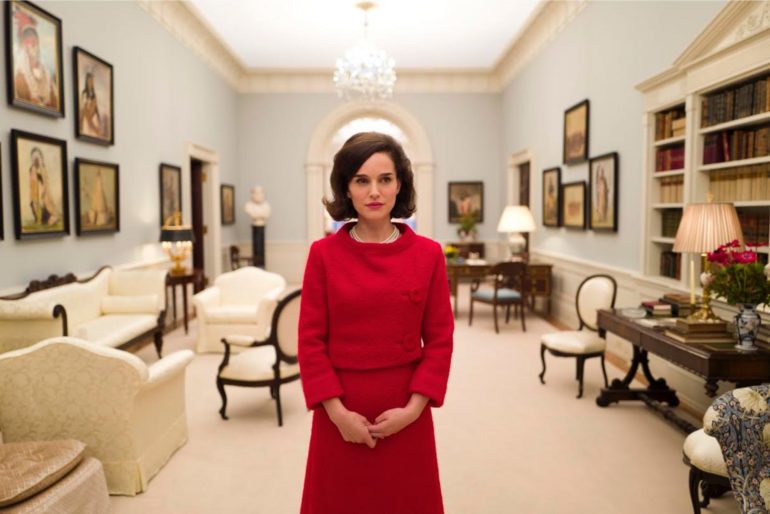In his recent farewell speech, outgoing U.S. President Barack Obama paid tribute to those closest and dearest to him, not least his wife Michelle. He described her as taking on a role she didn’t ask for and making it her own. The First Lady probably isn’t a job anyone actively seeks, yet it’s a role that has been inhabited by so many fascinating women through the years. Amidst the political strife that their husbands have to deal with, we tend to forget the sacrifices their spouses make, as per the demands of the new job. Jackie is an overdue look at the great woman behind the great man. With Jackie, Pablo Larraín has directed a film that fits surprisingly well into his oeuvre. It’s his second retelling of a clash of personal and political crises in a row (after Neruda), while narratively and thematically, it’s not a million miles off his acclaimed fourth feature, 2012’s No. Despite being a less-than-obvious choice of director, and making his English-language debut to boot, Larraín works well with stories of people aiming to turn negative circumstances into a resolute positive.
Amongst some of this year’s awards hopefuls, there’s a recurrent theme of unexpected reactions to trauma. The protagonists of Manchester By The Sea and Elle don’t readily react to their pasts or presents as a filmgoer might expect. Jackie carries on in a similar vein, telling a story we think we know through a lens of refracted grief. The filmed story of how Jacqueline Kennedy dealt with her sudden and painful loss lends her immense dignity and grace, no less than America’s most famous widow deserves. As played by Portman, Jackie offers us an approximation of its lead character. Portman is slighter and shorter than Kennedy but completely inhabits the role through careful adaptation of her mannerisms and earthy speaking voice. As written in Noah Oppenheim’s careful, fluent script, Jackie is a woman at once in awe of her life and circumstance, and yet always trying to keep it under control. Like other women of royalty (the Kennedys are the closest America gets to a royal family) and political standing, the erstwhile Ms Bouvier was extremely aware of her position and her image and sought to make the most of it. If Jackie herself aimed to endear her family to America whilst preserving the mythos of Camelot, then Jackie penetrates that mythos. Kennedy’s grace, style and beauty all blend into the Camelot ideal, but Portman and Larraín come in to pull the curtain back on a woman who is defined by her grief, to reveal someone who knew how best to use that pain.
Obviously, John F. Kennedy’s assassination is the key event of the film. However, the assassination and subsequent events are only seen in flashback. The film is framed by Jackie’s interview with journalist Theodore White (Billy Crudup, continuing a winning streak of slick turns in gilded films like Spotlight and 20th Century Women) just days after the funeral, in which she sought to shore up the image of the Kennedy family and presidency. As they begin, Jackie warns White, “I will be editing this conversation.” The choice to frame the film with this encounter is no coincidence; its themes of legacy and self-preservation are bolted down from the start. This is a film whose characters are determined to direct their own lives as much as Larrain is determined to expose those efforts. Whether through Stéphane Fontaine’s stylish but muted cinematography, or the drowsy strings on Mica Levi’s score, the clichés and glamour become something twisted and undermined. Jackie’s social secretary Nancy Tuckerman (Greta Gerwig) reminds the First Lady to smile before Larraín turns his gaze on the camera that will in turn film Jackie giving her famous 1962 CBS tour of the newly-restored and refurbished White House interiors. Jackie is designed to remind us that life in the public eye walks a fine line between performance and practicality. On the way to Dallas on that fateful November day in 1963, Jackie frequently adjusts her hot pink suit. The days after are (pre)occupied with the fine details of her husband’s funeral, which she arranges with her and JFK’s confidante William Walton (Richard E. Grant, lending gravitas with limited screentime). The inspiration is Lincoln’s funeral; Jackie is all too aware of the weight of history, and she seeks to rise to its call.
As smart as the script might be, and as self-aware as the direction can be, this film would be nothing without Portman, who is simply phenomenal. She never lets the lack of resemblance to the real Jackie undermine her, and never lets the accent or affectations overwhelm her. Like David Oyelowo in Selma, Portman’s approximation of Jackie is so commanding that you find no room to argue with it. During her interview, whilst lighting up a cigarette, she turns to White and says “I don’t smoke.” She may have lost so much, but Jackie is not letting anyone but herself write the history books. With Portman and a superb array of supports (Special mention to Peter Sarsgaard as a similarly dissimilar Bobby Kennedy), Jackie brings the events of November 1963 to vivid life. At one point, as JFK’s cortege makes it way through Washington’s streets, the ground-level camera looks up at Jackie behind her mourning veil; the grief cannot obscure the woman behind it. The methodology can be a little blunt on occasion (The use of Lerner and Loewe’s ‘Camelot’ is decidedly on-the-nose, as is John Hurt’s cameo as an unnecessarily Irish priest), but Larraín eventually gets through the glamorous facade to Jackie, standing alone and poised on the White House steps, making sure they see that “what they have done to Jack” was done to her and the country, too.

